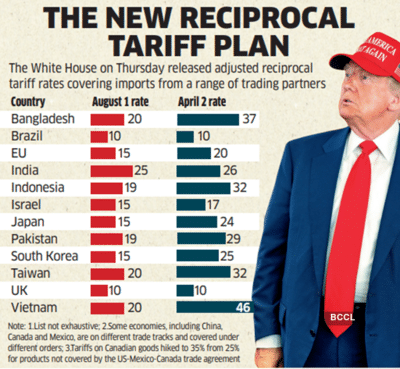WASHINGTON: U.S. President Donald Trump's latest wave of tariffs on exports from dozens of trading partners sent global stock markets tumbling on Friday and countries and companies scrambling to seek ways to strike better deals.
As Trump presses ahead with plans to reorder the global economy with the highest tariff rates since the early 1930s, Switzerland, "stunned" by 39% tariffs, sought more talks.
New tariffs also include a 35% duty on many goods from Canada, 50% for Brazil, 20% for Taiwan. Taiwan said its rate was "temporary" and it expected to reach a lower figure.
The presidential order listed higher import duty rates of 10% to 41% starting in a week's time for 69 trading partners, taking the U.S. effective tariff rate to about 18%, from 2.3% last year, according to analysts at Capital Economics.
Trump's new tariffs have created yet more uncertainty, with many details unclear. They are set to take effect on Aug 7 at 0401 GMT, a White House official said.
The European Union, which struck a framework deal with Trump on Sunday, is still awaiting more Trump orders to deliver on agreed carve-outs, including on cars and aircraft, EU officials said, saying the latest executive orders did not cover that.
Also, it is unclear how the administration intends to define and police the transshipment restrictions, which threaten 40% levies on any exporter deemed to have tried to mask goods from a higher-tariffed originator, such as China, as their own product.

The new tariffs will kick in at what has become a perilous moment for the U.S. economy, with U.S. data on Friday showing employment growth was weaker than thought previously.
Trump's tariff rollout also comes amid evidence they have begun driving up prices. U.S. Commerce Department data released Thursday showed prices for home furnishings and durable household equipment jumped 1.3% in June, the biggest gain since March 2022.
NO WINNERS?
Countries hit with hefty tariffs said they will seek to negotiate with the U.S. in hopes of getting a lower rate.
Switzerland said it would push for a "negotiated solution" with the U.S.
"It's a massive shock for the export industry and for the whole country. We are really stunned," said Jean-Philippe Kohl, deputy director of Swissmem, representing Switzerland's mechanical and electrical engineering industries.
South Africa's Trade Minister Parks Tau said he was seeking "real, practical interventions" to defend jobs and the economy against the 30% U.S. tariff it faces.
Southeast Asian countries, however, breathed a sigh of relief after the U.S. tariffs on their exports that were lower than threatened and levelled the playing field with a rate of about 19% across the region's biggest economies.
As Trump presses ahead with plans to reorder the global economy with the highest tariff rates since the early 1930s, Switzerland, "stunned" by 39% tariffs, sought more talks.
New tariffs also include a 35% duty on many goods from Canada, 50% for Brazil, 20% for Taiwan. Taiwan said its rate was "temporary" and it expected to reach a lower figure.
The presidential order listed higher import duty rates of 10% to 41% starting in a week's time for 69 trading partners, taking the U.S. effective tariff rate to about 18%, from 2.3% last year, according to analysts at Capital Economics.
Trump's new tariffs have created yet more uncertainty, with many details unclear. They are set to take effect on Aug 7 at 0401 GMT, a White House official said.
The European Union, which struck a framework deal with Trump on Sunday, is still awaiting more Trump orders to deliver on agreed carve-outs, including on cars and aircraft, EU officials said, saying the latest executive orders did not cover that.
Also, it is unclear how the administration intends to define and police the transshipment restrictions, which threaten 40% levies on any exporter deemed to have tried to mask goods from a higher-tariffed originator, such as China, as their own product.
The new tariffs will kick in at what has become a perilous moment for the U.S. economy, with U.S. data on Friday showing employment growth was weaker than thought previously.
Trump's tariff rollout also comes amid evidence they have begun driving up prices. U.S. Commerce Department data released Thursday showed prices for home furnishings and durable household equipment jumped 1.3% in June, the biggest gain since March 2022.
NO WINNERS?
Countries hit with hefty tariffs said they will seek to negotiate with the U.S. in hopes of getting a lower rate.
Switzerland said it would push for a "negotiated solution" with the U.S.
"It's a massive shock for the export industry and for the whole country. We are really stunned," said Jean-Philippe Kohl, deputy director of Swissmem, representing Switzerland's mechanical and electrical engineering industries.
South Africa's Trade Minister Parks Tau said he was seeking "real, practical interventions" to defend jobs and the economy against the 30% U.S. tariff it faces.
Southeast Asian countries, however, breathed a sigh of relief after the U.S. tariffs on their exports that were lower than threatened and levelled the playing field with a rate of about 19% across the region's biggest economies.
You may also like

'I'm a shopping writer and these are the holiday clothes I'd buy for under £30'

Gwyneth Paltrow book bombshells from Madonna fall out to x-rated Ben Affleck confession

Antiques Roadshow expert taken aback by how guest uses collectible jug she paid £2.50 for

Sarina Wiegman showed true colours after controversy tore through Spain before Euro 2025

The one thing the Queen Mother always said when she visited the nudist beach






